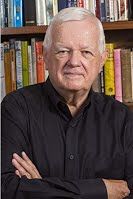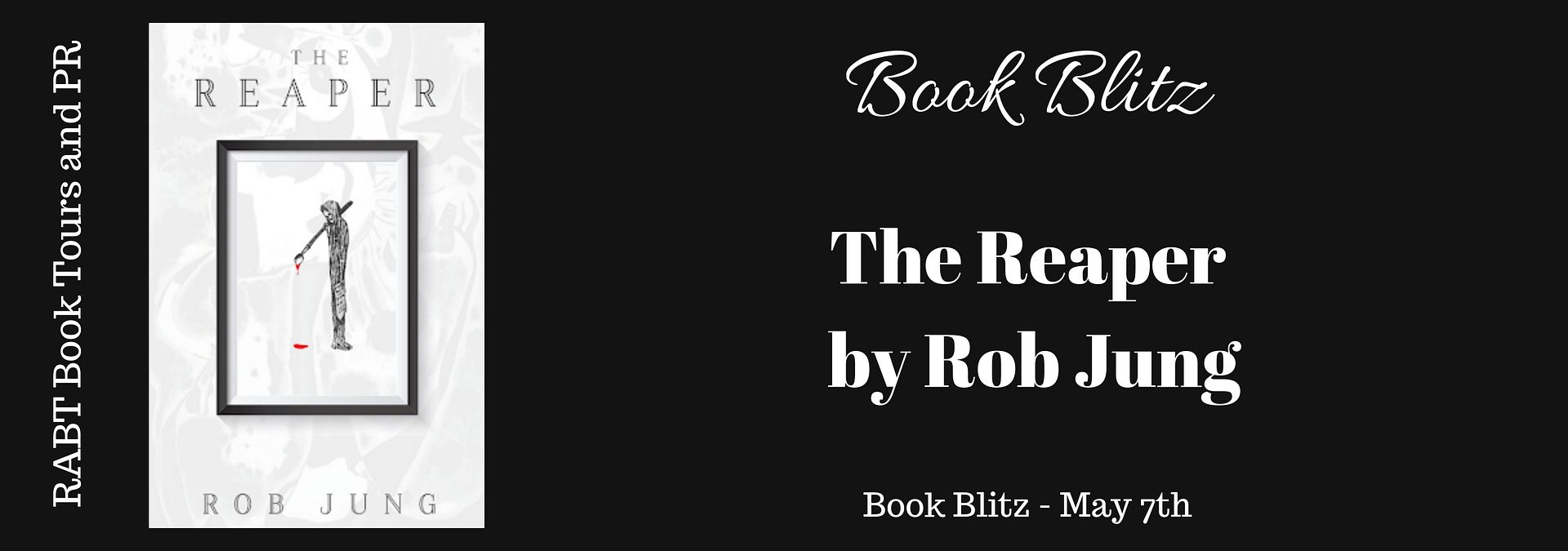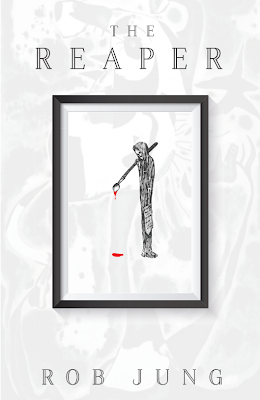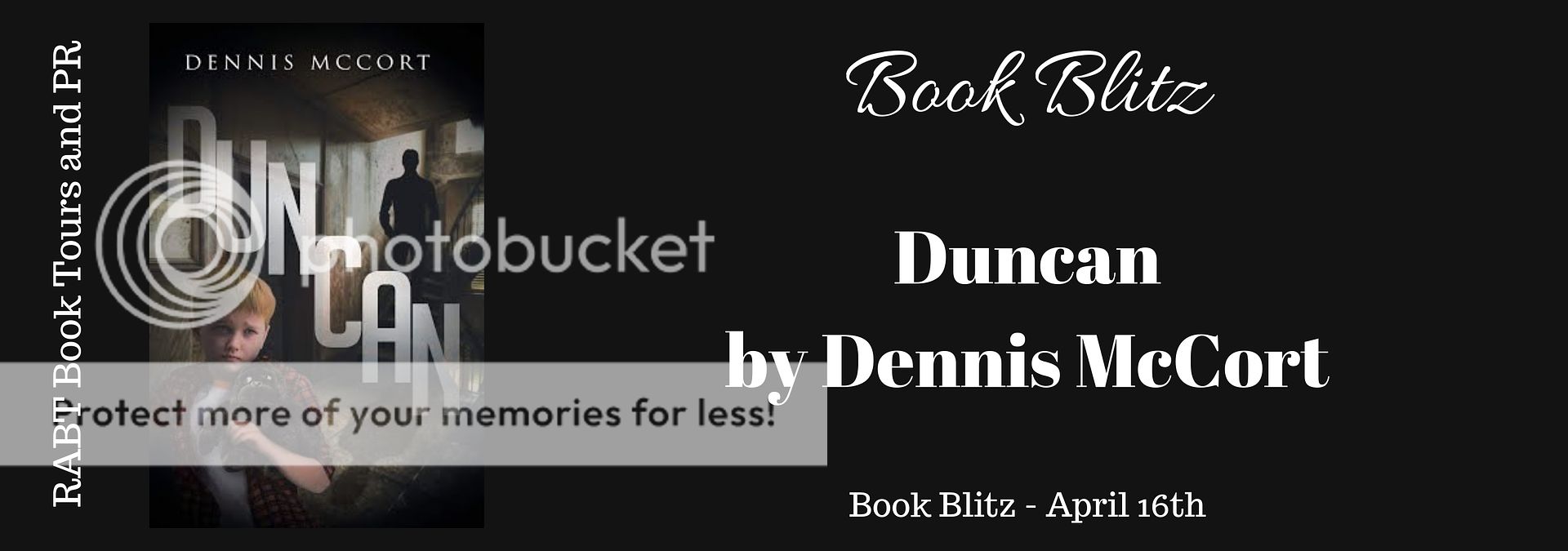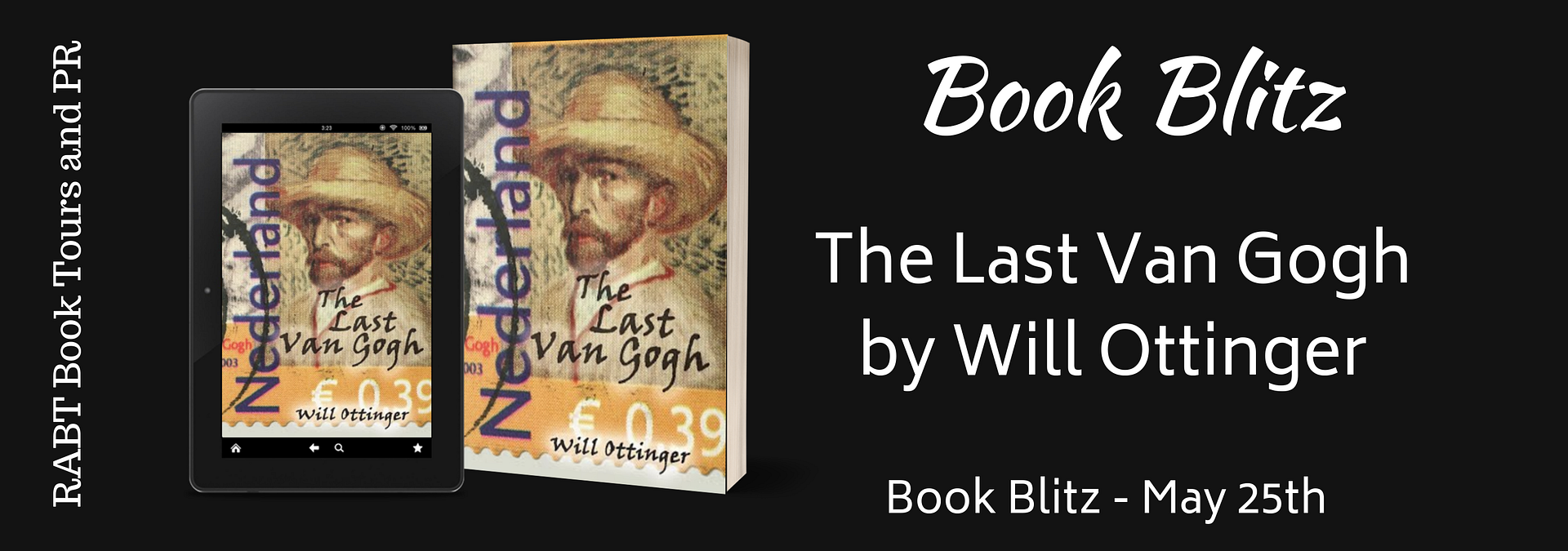
Mystery,
Thriller
Thriller
Date
Published: March 2019
Published: March 2019
Publisher:
Black Rose Writing
Black Rose Writing
“The
Last Van Gogh” received the 2019 Maxy Award for Best Mystery-Detective
Novel
Last Van Gogh” received the 2019 Maxy Award for Best Mystery-Detective
Novel
A
brilliant and troubled artist. A lost masterpiece. The desperate search for the
truth.
brilliant and troubled artist. A lost masterpiece. The desperate search for the
truth.
An
unknown Van Gogh painting disappears from France at the outbreak of World War
Two. A notorious con man later claims he smuggled the immense painting to the
U.S. where it is never seen again. Ninety years later, his two sons, Adam and
Wesley Barrow, discover letters that supposedly confirm the painting’s
existence, now valued at $250 million if it exists.
unknown Van Gogh painting disappears from France at the outbreak of World War
Two. A notorious con man later claims he smuggled the immense painting to the
U.S. where it is never seen again. Ninety years later, his two sons, Adam and
Wesley Barrow, discover letters that supposedly confirm the painting’s
existence, now valued at $250 million if it exists.
Dogged
by a dysfunctional childhood and skeptical of his father’s tale, Adam at first
dismisses the old letters.
by a dysfunctional childhood and skeptical of his father’s tale, Adam at first
dismisses the old letters.
The
painting’s possible existence also attracts the attention of three unscrupulous
collectors, all former associates of
his father, one of whom engages a
professional killer to find the painting.
painting’s possible existence also attracts the attention of three unscrupulous
collectors, all former associates of
his father, one of whom engages a
professional killer to find the painting.
Doubtful
of its existence, Adam teams with Katya Veranova, a beautiful KGB defector and
ex-assassin, as they travel to Holland, Paris, California, and New York on a
desperate mission, forming an intimate but tenuous bond. Tracked by the unseen
contract killer and threatened at every turn, Adam and Kat face increasing
danger in their quest to find the last Van Gogh.
of its existence, Adam teams with Katya Veranova, a beautiful KGB defector and
ex-assassin, as they travel to Holland, Paris, California, and New York on a
desperate mission, forming an intimate but tenuous bond. Tracked by the unseen
contract killer and threatened at every turn, Adam and Kat face increasing
danger in their quest to find the last Van Gogh.
Excerpt
Chapter
Four
Four
The ambulance bearing Wes disappeared around
the corner onto Wells Street, siren moaning as traffic pulled to the curb to
let Chicago’s latest casualty pass. They’d removed Vasily’s body after a flurry
of police photographs, Chicago’s finest dispersing the gawkers. The storm
whipped gray curtains of rain off Lake Michigan, washing blood from the
sidewalk as I surveyed the damage.
the corner onto Wells Street, siren moaning as traffic pulled to the curb to
let Chicago’s latest casualty pass. They’d removed Vasily’s body after a flurry
of police photographs, Chicago’s finest dispersing the gawkers. The storm
whipped gray curtains of rain off Lake Michigan, washing blood from the
sidewalk as I surveyed the damage.
Red
and blue strobes atop the remaining police cars illuminated my gallery like a
roadside strip club. Inside the shattered window, a desecrated painting hung
askew on the nearest wall, its frame splintered, the canvas holed by bullets.
Beneath the destroyed Expressionist nude, crumbled wallboard fragments littered
my proud new carpet. None of it mattered so long as Wes was alive.
and blue strobes atop the remaining police cars illuminated my gallery like a
roadside strip club. Inside the shattered window, a desecrated painting hung
askew on the nearest wall, its frame splintered, the canvas holed by bullets.
Beneath the destroyed Expressionist nude, crumbled wallboard fragments littered
my proud new carpet. None of it mattered so long as Wes was alive.
I
raised my coat collar and retreated beneath the awning followed by a bored
Chicago police sergeant, glass crunching under our shoes. The cop was a street
veteran down to a scarred chin and wary expression, his belly encroaching on
his belt buckle. He removed his brimmed hat and brushed rainwater from the
clear plastic covering, wiping the checkered band with a thick thumb before he
tugged it back on with a street-weary sigh.
raised my coat collar and retreated beneath the awning followed by a bored
Chicago police sergeant, glass crunching under our shoes. The cop was a street
veteran down to a scarred chin and wary expression, his belly encroaching on
his belt buckle. He removed his brimmed hat and brushed rainwater from the
clear plastic covering, wiping the checkered band with a thick thumb before he
tugged it back on with a street-weary sigh.
“Looks like you and your brother
dodged a bullet,” he said with a caustic half-smile. Discomfited by my
expression, he said, “Well, he didn’t actually dodge it. The EMT’s said the
bullet nicked the back of his calf without finding bone. Some blood loss but no
permanent damage.”
dodged a bullet,” he said with a caustic half-smile. Discomfited by my
expression, he said, “Well, he didn’t actually dodge it. The EMT’s said the
bullet nicked the back of his calf without finding bone. Some blood loss but no
permanent damage.”
“I’ve got to call his wife,” I
said.
said.
“Sure, in a minute. First, you
wanna tell me what happened?”
wanna tell me what happened?”
Across the rain-slicked street, the
space sat empty where the Lincoln had waited for us. “We walked out and someone
started shooting from a car parked across the street.”
space sat empty where the Lincoln had waited for us. “We walked out and someone
started shooting from a car parked across the street.”
The cop contemplated my shattered
window. “I don’t figure the boys from the projects, but you never know about
those crazy bastards.”
window. “I don’t figure the boys from the projects, but you never know about
those crazy bastards.”
I shook my head, recalling the
tinted window sliding down. Maybe a loan shark fed up with Wes’s late payments?
“The car was a black stretch Lincoln, the kind limo owners drive.”
tinted window sliding down. Maybe a loan shark fed up with Wes’s late payments?
“The car was a black stretch Lincoln, the kind limo owners drive.”
The cop took a cheap spiral
notebook from his yellow raincoat and made a note. “But it could be gang
bangers the projects. They like to cruise the streets at night,” he said. “Lot
of random shootings. The worst call themselves the Deuce’s Disciples.” He
kicked at the glass rubble around our feet. “I think tonight probably was a
screw-up. Mistaken identity or drug deal gone bad.”
notebook from his yellow raincoat and made a note. “But it could be gang
bangers the projects. They like to cruise the streets at night,” he said. “Lot
of random shootings. The worst call themselves the Deuce’s Disciples.” He
kicked at the glass rubble around our feet. “I think tonight probably was a
screw-up. Mistaken identity or drug deal gone bad.”
I
didn’t say so but the cop’s reasoning didn’t feel right, a bunch of brainless
bangers shooting up an art gallery from a limousine. Glad to be out of the
rain, the cop made another note and took on the jaded expression of
investigating endless mayhem. Another Saturday night shooting and one more
bewildered citizen he was supposed to protect.
didn’t say so but the cop’s reasoning didn’t feel right, a bunch of brainless
bangers shooting up an art gallery from a limousine. Glad to be out of the
rain, the cop made another note and took on the jaded expression of
investigating endless mayhem. Another Saturday night shooting and one more
bewildered citizen he was supposed to protect.
“The
dead guy,” he asked. “Customer?”
dead guy,” he asked. “Customer?”
“One
of my artists.” I almost told him about Vasily’s uncle and decided against it.
The police would find out soon enough, and a whole new avenue of investigation
would begin, including my association with Viktor Krushenko. I didn’t want to
think about it.
of my artists.” I almost told him about Vasily’s uncle and decided against it.
The police would find out soon enough, and a whole new avenue of investigation
would begin, including my association with Viktor Krushenko. I didn’t want to
think about it.
The sergeant closed the notebook.
“The detectives will want to talk with you tomorrow.” He frowned at the rain
blowing through my broken window. “Lousy fucking weather. Better get something
over that hole. We’ll keep a man here until you leave,”
“The detectives will want to talk with you tomorrow.” He frowned at the rain
blowing through my broken window. “Lousy fucking weather. Better get something
over that hole. We’ll keep a man here until you leave,”
He ambled back to the circus parade
of flashing lights and I went inside, wondering where in hell I’d find someone
to board up a window on Saturday night. I’d lugged the exposed paintings to the
work area, too disheartened to touch the ruined painting. I thought about Viktor
and knew I should call him, but I put it off. Viktor would know about the
attack soon enough and I tried not to think about what might follow. Vasily was
dead and that would bring repercussions for someone. Possibly me.
of flashing lights and I went inside, wondering where in hell I’d find someone
to board up a window on Saturday night. I’d lugged the exposed paintings to the
work area, too disheartened to touch the ruined painting. I thought about Viktor
and knew I should call him, but I put it off. Viktor would know about the
attack soon enough and I tried not to think about what might follow. Vasily was
dead and that would bring repercussions for someone. Possibly me.
I called Barbara and got her calmed
down after a few minutes, explaining Wes was basically okay. She kept asking me
why Wes had been shot but I had no answer. I gave her the name of the hospital
where they’d taken him and said I’d meet her there. Hanging up, I stared at the
jagged hole where my front window once existed. I waved to the cop stationed at
the door and went to my office. Thumbing my iPhone for repair companies I
located one open 24/7. The answering service claimed they’d be on their way
within the hour and I almost believed the voice. Bundled in a raincoat I walked
outside and told the patrolman to go home, that I’d wait until the hole was
boarded up.
down after a few minutes, explaining Wes was basically okay. She kept asking me
why Wes had been shot but I had no answer. I gave her the name of the hospital
where they’d taken him and said I’d meet her there. Hanging up, I stared at the
jagged hole where my front window once existed. I waved to the cop stationed at
the door and went to my office. Thumbing my iPhone for repair companies I
located one open 24/7. The answering service claimed they’d be on their way
within the hour and I almost believed the voice. Bundled in a raincoat I walked
outside and told the patrolman to go home, that I’d wait until the hole was
boarded up.
I
pulled up a chair by the front door as the adrenaline ebbed, watching cars slow
to ogle the destruction. Gusts of rain gleefully destroyed my new carpet and I
tried not to calculate replacement cost, wondering if my insurance covered
gunfire. To my surprise a panel truck arrived half an hour later. Two workmen
hammered up plywood sheeting, the rough wooden patch blighting the front of my
beautiful gallery.
pulled up a chair by the front door as the adrenaline ebbed, watching cars slow
to ogle the destruction. Gusts of rain gleefully destroyed my new carpet and I
tried not to calculate replacement cost, wondering if my insurance covered
gunfire. To my surprise a panel truck arrived half an hour later. Two workmen
hammered up plywood sheeting, the rough wooden patch blighting the front of my
beautiful gallery.
Not
owning a car in a city where parking was a mixture of fate and voodoo, I called
Uber to take me to the hospital. During the ride, it occurred to me the
gunshots had been oddly muffled. I hadn’t told the cop, but the recollection
increased my uneasiness. Why would underage gangsters or a shyster bother with
a silencer?
owning a car in a city where parking was a mixture of fate and voodoo, I called
Uber to take me to the hospital. During the ride, it occurred to me the
gunshots had been oddly muffled. I hadn’t told the cop, but the recollection
increased my uneasiness. Why would underage gangsters or a shyster bother with
a silencer?
***
Wes had been discharged by the time
I reached the hospital. A young black intern assured me the injury wasn’t
serious enough to keep him overnight. In the midst of usual Saturday night
mayhem and need for beds, they’d bound the wound and released him with a supply
of pain killers.
I reached the hospital. A young black intern assured me the injury wasn’t
serious enough to keep him overnight. In the midst of usual Saturday night
mayhem and need for beds, they’d bound the wound and released him with a supply
of pain killers.
It was still raining as I called
Uber again and headed for Wes’s apartment. Barbara let me in and I found Wes
with a glass in his hand, leg propped on an ottoman, his smile vacant.
Uber again and headed for Wes’s apartment. Barbara let me in and I found Wes
with a glass in his hand, leg propped on an ottoman, his smile vacant.
“Hey, this Vicodin is great stuff,”
he said as if he’d discovered the solution to world peace.
he said as if he’d discovered the solution to world peace.
Barbara
sat on the arm of his chair and shook her head at me with less than fawning
eyes. She inclined her head at the glass in his hand.
sat on the arm of his chair and shook her head at me with less than fawning
eyes. She inclined her head at the glass in his hand.
“Water,” she informed me.
Maybe the shooting would prove a
respite for him. Provide an enforced vacation from his favorite lounges and
liquor stores. Barbara sure as hell wasn’t going to let him mix painkillers
with booze. I pulled up a straight-backed chair from the dining room and tried
to smile.
respite for him. Provide an enforced vacation from his favorite lounges and
liquor stores. Barbara sure as hell wasn’t going to let him mix painkillers
with booze. I pulled up a straight-backed chair from the dining room and tried
to smile.
“You okay?” I asked.
“Is Vasily dead?”
I nodded.
“Damn. He seemed like a great guy.”
“He
was.”
was.”
Wes shifted his weight and winced.
I looked around. The apartment was sparser than I remembered, and Barbara
appeared five years older. She was a lean woman who never worried about her
weight, a great wife to Wes but not my biggest fan. She believed I enabled him
with loans and bail money, short term solutions to his deeper issues. But what
was I supposed to do? Leave him to the mercy of the drunk tank? She loved him
in her own patient way that allowed me to look beyond her faults, mainly her dislike
of me.
I looked around. The apartment was sparser than I remembered, and Barbara
appeared five years older. She was a lean woman who never worried about her
weight, a great wife to Wes but not my biggest fan. She believed I enabled him
with loans and bail money, short term solutions to his deeper issues. But what
was I supposed to do? Leave him to the mercy of the drunk tank? She loved him
in her own patient way that allowed me to look beyond her faults, mainly her dislike
of me.
She
hovered over Wes, curly auburn hair and blouse still damp from the rain, her
face wet with tears. “This is quite a night,” she snapped, her voice trembling
as she brushed away a limp strand of hair. “Our home gets broken into, then you
call to tell me Wes has been shot.”
hovered over Wes, curly auburn hair and blouse still damp from the rain, her
face wet with tears. “This is quite a night,” she snapped, her voice trembling
as she brushed away a limp strand of hair. “Our home gets broken into, then you
call to tell me Wes has been shot.”
“You got robbed?” was all I could
think to say.
think to say.
“Never imagined the art business
was this violent,” Wes laughed, his eyes swimming with the Vicodin. “Russian
gangsters and artists murdered in the street.”
was this violent,” Wes laughed, his eyes swimming with the Vicodin. “Russian
gangsters and artists murdered in the street.”
“You sure you’re alright?”
He held up the glass of water. “I’m
fine, but I never needed a drink more in my life. What the hell happened?”
fine, but I never needed a drink more in my life. What the hell happened?”
“The cops aren’t sure.”
“Great location you picked, Adam”
Barbara said over her shoulder as she strode to the kitchen. “A trendy
neighborhood. You serve Sneaky Pete wine at your gala last night?”
Barbara said over her shoulder as she strode to the kitchen. “A trendy
neighborhood. You serve Sneaky Pete wine at your gala last night?”
“C’mon, Barbara,” Wes croaked.
I resented her criticism. I hadn’t
envisioned a shooting gallery when I selected the location. “You’re clear on
the other side of town and you got robbed,” I reminded her, although the sparse
apartment didn’t appear a likely target.
envisioned a shooting gallery when I selected the location. “You’re clear on
the other side of town and you got robbed,” I reminded her, although the sparse
apartment didn’t appear a likely target.
“We need to talk about what
happened,” Wes said.
happened,” Wes said.
“I’ll talk with detectives
tomorrow. The cop told me…”
tomorrow. The cop told me…”
“Not about the shooting,” Wes said.
“The break-in.”
“The break-in.”
“Wes,” Barbara called from the
kitchen, “don’t start again.”
kitchen, “don’t start again.”
“He needs to know.”
“Know what?” I asked.
Barbara sat on Wes’s chair arm
again and lightly ran her fingers through his hair. “He’s not making a lot of
sense, what with the pills and all,” she said. “Something about a Van Gogh
painting your father claimed to have owned.”
again and lightly ran her fingers through his hair. “He’s not making a lot of
sense, what with the pills and all,” she said. “Something about a Van Gogh
painting your father claimed to have owned.”
“He told me about that, but what am
I missing here?”
I missing here?”
“The letters are gone,” Wes said.
“We checked but they’re not here. Nothing else was taken.”
“We checked but they’re not here. Nothing else was taken.”
“You sure the letters were here?”
“I changed clothes before I came to
the gallery. They were in my jacket.” He looked on the verge of bursting into
tears. “Our one link to the painting.”
the gallery. They were in my jacket.” He looked on the verge of bursting into
tears. “Our one link to the painting.”
“You’re sure they were stolen.”
“I’m a recovering drunk, not a
moron,” Wes snapped, slumping back in the chair as the pills worked their
magic.
moron,” Wes snapped, slumping back in the chair as the pills worked their
magic.
Barbara shot me a warning look that
hovered between ‘help me’ and ‘get the hell out of here.’ It was obvious they’d
fought a war over a fictional masterpiece that would solve their problems.
hovered between ‘help me’ and ‘get the hell out of here.’ It was obvious they’d
fought a war over a fictional masterpiece that would solve their problems.
Wes bent forward and winced.
“Dammit, Barbara, it’s real.”
“Dammit, Barbara, it’s real.”
She searched his haggard face, her
own reflecting defeat fostered by years of disappointment. She started to reply
but looked away.
own reflecting defeat fostered by years of disappointment. She started to reply
but looked away.
“Okay, I’ll agree our old man was
crazy,” Wes admitted, “but he had no reason to lie to us. No money in lying. If
he owned a forgery, why didn’t he pawn it off on somebody years ago? God knows
he always needed money.”
crazy,” Wes admitted, “but he had no reason to lie to us. No money in lying. If
he owned a forgery, why didn’t he pawn it off on somebody years ago? God knows
he always needed money.”
“This is crazy,” Barbara said.
“What about us? You’re putting this fantasy before everything we’re trying to
do. You’re in no shape to traipse after some painting. In case you haven’t
noticed, we’re almost broke. Where do you think we’ll find money to search for
your Eldorado? You have a portfolio or bank account I don’t know about?”
“What about us? You’re putting this fantasy before everything we’re trying to
do. You’re in no shape to traipse after some painting. In case you haven’t
noticed, we’re almost broke. Where do you think we’ll find money to search for
your Eldorado? You have a portfolio or bank account I don’t know about?”
“Maybe we can find a backer.” Wes
insisted. I’d heard the same desperation when he discovered a liquor bottle was
empty. He looked up at me. “What about your gangster friend?”
insisted. I’d heard the same desperation when he discovered a liquor bottle was
empty. He looked up at me. “What about your gangster friend?”
“Viktor Krushenko is not my
friend.”
friend.”
“He was Vasily’s uncle. He could
help us.”
help us.”
“Wes, do you have any idea who
these people are? Where their money comes from? It’s possible Viktor was trying
to get rid of me after our argument. The bastard’s crazy, you saw that. You
heard how unhappy he was about the split Vasily was getting. Maybe he meant the
shooting as an object lesson to me and he screwed up. Either way, he won’t be a
happy Boy Scout when he finds out Vasily’s dead.”
these people are? Where their money comes from? It’s possible Viktor was trying
to get rid of me after our argument. The bastard’s crazy, you saw that. You
heard how unhappy he was about the split Vasily was getting. Maybe he meant the
shooting as an object lesson to me and he screwed up. Either way, he won’t be a
happy Boy Scout when he finds out Vasily’s dead.”
“We need to find a way,” Wes said,
his optimism bolstered by the pain killers.
his optimism bolstered by the pain killers.
Barbara turned away again and I was
out of arguments. Our dead father was ripping our lives apart yet again, his
sons lost in his dysfunctional shadow.
out of arguments. Our dead father was ripping our lives apart yet again, his
sons lost in his dysfunctional shadow.
About
the Author
the Author
Will
Ottinger spent his early life in Savannah, Georgia. A graduate of Emory
University with a BA in history, he is also a graduate of Northwestern Graduate
Trust School in Chicago.
Ottinger spent his early life in Savannah, Georgia. A graduate of Emory
University with a BA in history, he is also a graduate of Northwestern Graduate
Trust School in Chicago.
His
first novel, A Season for Ravens, published in 2014, was named by Reader Views
as one of its top-three Historical Fiction works of 2014-2015. The second novel, The Savannah Betrayals, was
published in March, 2018. His third
novel, The Last Van Gogh, was released in March, 2019 by Black Rose Writing.
Windrow and Greene Publishers in Great Britain earlier published his
non-fiction work on the art of historical miniatures, an art form in which he
gained international recognition as a Grand Master painter. He authored a magazine column for seven
years, trained and lectured extensively in the financial field, wrote articles
for trust and investment publications, and has spoken to large and small
audiences. He served as president of Scribbler’s Ink, a Houston writers’ group.
first novel, A Season for Ravens, published in 2014, was named by Reader Views
as one of its top-three Historical Fiction works of 2014-2015. The second novel, The Savannah Betrayals, was
published in March, 2018. His third
novel, The Last Van Gogh, was released in March, 2019 by Black Rose Writing.
Windrow and Greene Publishers in Great Britain earlier published his
non-fiction work on the art of historical miniatures, an art form in which he
gained international recognition as a Grand Master painter. He authored a magazine column for seven
years, trained and lectured extensively in the financial field, wrote articles
for trust and investment publications, and has spoken to large and small
audiences. He served as president of Scribbler’s Ink, a Houston writers’ group.
Former
founder and owner of a wealth management training/consulting firm, he and his
wife also owned an art gallery in downtown Chicago. Both are inveterate fly
fishermen and now live in Atlanta Georgia.
founder and owner of a wealth management training/consulting firm, he and his
wife also owned an art gallery in downtown Chicago. Both are inveterate fly
fishermen and now live in Atlanta Georgia.
Contact
Links
Links
Purchase
Links
Links


